- Home
- Alice Hoffman
Faithful
Faithful Read online
Thank you for downloading this Simon & Schuster eBook.
* * *
Sign up for our newsletter and receive special offers, access to bonus content, and info on the latest new releases and other great eBooks from Simon & Schuster.
CLICK HERE TO SIGN UP
or visit us online to sign up at
eBookNews.SimonandSchuster.com
Ring the bells that still can ring
Forget your perfect offering
There is a crack in everything
That’s how the light gets in.
—“ANTHEM” BY LEONARD COHEN
CHAPTER
1
In February, when the snow comes down hard, little globes of light are left along Route 110, on the side of the road that slopes off when a driver least expects it. The lights are candles set inside paper bags, surrounded by sand, and they burn past midnight. They shouldn’t last for that amount of time, but that’s part of the miracle. On the second anniversary of the accident, a gang of boys creep out their windows and gather at two in the morning to see if Helene’s mother, Diana Boyd, drives along the road replacing each melting pool of wax with a fresh candle. They’re hoping to reveal a con in process and dispel the myth of a miracle, but after keeping watch for a while the boys all flee. In the early morning hours, safe in their beds, they wonder how much of the world can never be understood or explained.
The light globes are made at the high school where Helene was a senior before the accident. People who never even knew her spend all afternoon in the cafeteria filling up paper bags. The first year, the art teacher ordered special sand from Arizona and the candles glowed with red light, but now the sand is trucked in from Heyward’s Gravel Pit, and it’s pure white. It looks like diamonds when you run it through your fingers.
There are dozens of high school girls who lock themselves in their bedrooms on the anniversary night, their hands dusted with luminous sand, prayers on their lips, their hearts heavy with sorrow. Each one thanks her lucky stars she is not Helene, even though Helene was the beautiful girl who could do as she pleased, the one every boy wanted to date and every girl wanted to be like. But that was then. Now even the outcasts—the fat, the unattractive, the lonely, the sorrowful, the lost—are grateful to be who they are, at least for a single evening. Even the most selfish girls—the ones who think nothing of snubbing their less attractive and popular classmates—offer to collect the spent paper bags on their way to school on the morning after the anniversary. The wax will still be hot; the wicks give off smoke. Occasionally a candle will still be burning, so fresh it’s as though it had just been lit. Then the girls gather round in awe and solidarity, even the ones who hate each other. They close their eyes and make a wish, the same one every time: Let it never be me.
The one person who has never been included in the anniversary events, not the safe driving assembly at the school, or the candlelighting ceremony on the corner of Main Street and Route 110, or the prayer vigil at the Boyds’ house, is Shelby Richmond. Not that she’s a high school girl anymore; she graduated when Helene would have, or more correctly, the administration took pity on her and granted her a diploma after she was released from the hospital. Shelby’s mother gave her a thin gold watch that she has never worn. Shelby doesn’t want a gift and she doesn’t want anything beautiful and she certainly doesn’t want to know what time it is. She didn’t go off to college the way she and Helene had planned. She was Helene’s confidante, pretty enough, but not the beautiful one. She was the smart one, the one who often did homework for them both. For her, time has stopped. The girls had applied to NYU and were accepted, but it was too late for Helene, and as it turned out, too late for Shelby as well. Shelby’s parents paid the first semester’s tuition, but she didn’t leave on the appointed day, or the day after, or the one after that. Her suitcases sat in the front hall until her parents lost hope, until the leaves started changing. They waited so long to withdraw her they lost all that tuition money for nothing.
Shelby has not done anything with her life since the night when it happened. Two years have passed, but it might as well be a moment since Helene was injured. Everything that has happened since doesn’t matter. Hours and days are mere flashes: the ER room, the instant she slit her wrists after they stitched her up and declared her recovered from the crash and sent her home, the gray, hazy moment when she was locked into a psych ward, the sound of the door opening when her mother brought her back home. Shelby blinks her eyes and she’s right back in the car. They’d had a disagreement that night because Shelby didn’t want to go out and Helene did. Of course Helene got her way. Shelby always gave in. If she refused, Helene would find someone new to follow her around. Shelby hasn’t told anyone the truth about that night because it sounds as if she were making excuses. But truly, Helene wouldn’t take no for an answer. She was so annoyed when Shelby hesitated that she took off the matching bracelet to Shelby’s that she always wore. Helene’s bracelet had a white enameled butterfly charm; Shelby’s butterfly was black. Helene was the leader. She had a charming, forceful personality, and unlike Shelby, Helene always knew what she wanted. As it turned out, she forgot the bracelet when they went out and Shelby lost hers in the accident. The chain must have snapped when Shelby was lying on the ice, gasping for breath, bleeding through her clothes until her sweater and jeans were soaked through. She’s gone back to search for the charm, but there’s nothing in the tall weeds along the road, only some broken glass that glints blue in the sunlight.
Sometimes when Shelby turns her head too quickly she can swear Helene is there. She doesn’t trust her eyesight even though on her last eye exam her vision was twenty-twenty. Still she is convinced that something is wrong with her vision. It’s been so ever since that night. When she looked up, she saw an angel. It’s a moment that still burns inside her. He leaned over and covered her with his black coat and said she couldn’t give up. She was shivering and her soul was in her mouth, ready to escape as a puff of air, but the angel kept her on earth. She knows it’s insanity to think so. She doesn’t need a psychiatrist to tell her that. She told no one in the psychiatric hospital, not even when they asked her directly: Do you believe in demons and angels? Do you see things that aren’t there?
Why would an angel rescue her when she’s worthless and Helene, who was so much better than she could ever be, was right there, in desperate need of help? All the same, every time she sees a man in a black coat she wonders if it’s her angel, and every time she’s mistaken. She stares at these men a little too long and they get the wrong idea. Hey, wait up, these men say to her when she walks on, along the highway or Main Street. She must look desperate, like someone who would be easy to command. Come on sister, darling, babygirl. She walks faster when this happens. She knows the difference between a demon and an angel, even in the dark. She learned that in the hospital, and she’s not going back there again. On some nights she hears her mother calling her as she wanders through town. Shelby’s mom drives through the streets, searching for Shelby at two or three in the morning. Her mom pulls over and gets out of her car and shouts for her, but Shelby ducks behind the shrubbery. She never answers. She’s simply not worthy of her mother’s love.
Nowadays Shelby sleeps most of the time, dreaming of the way it used to be, back when she didn’t think about anything, when the whole world was blue and shining, a globe no more complicated than a Christmas ball. Her diagnosis is major depression. She also has anxiety, survivor’s guilt, and post-traumatic stress. She was in the ER for only one night after the accident, but she had a three-month stay in the psych hospital soon afterward. She had stopped talking. She refused to eat. Then came the moment when she sat in the shower with a razor in her hands. She was so cold but that d
idn’t stop her. She cut across her wrist, where the vein was blue. Her blood was so bright. She heard the door open and her mother cry out, and she felt how cold it was when the water was turned off. Her mother was screaming for her father to call an ambulance, but she didn’t leave Shelby. She crouched beside Shelby on the shower floor and tied a towel around her wrist to stanch the flow of blood. “It’s okay, baby,” Shelby’s mom said. Someone was sobbing. Shelby’s mother wrapped herself around Shelby’s shivering, naked body.
At the hospital nobody visited except her mother. Nobody phoned. Nobody missed her. Rumors had begun in town. She was crazy. It was all her fault. She was bad luck and should be avoided at all costs. Girls who had been friends with Helene and Shelby decided they had lost both friends. It was easier that way. What was gone was gone.
A week passed, and then two, and soon Shelby stopped counting. She was disappearing inch by inch, vanishing into thin air, and then one day a postcard arrived. The nurse at the desk called Shelby’s name during mail call.
“Wake up, kiddo,” the nurse shouted when Shelby didn’t respond. Shelby was in the TV lounge dozing from the meds they gave her and listening to a talk show her mother liked featuring a group of women who argued about politics and gossiped about famous people.
“Shelby Richmond.” The nurse sounded more annoyed than usual. “Get your ass over here.”
Shelby went over to the desk, convinced it was a mistake.
“Take it,” the nurse said, so Shelby did. “Thank you,” the nurse said sarcastically, since Shelby still wasn’t talking. She hadn’t said a word since she woke up in the hospital the morning after the accident.
On the front of the postcard there was a delicate ink sketch of a family: a mother, a father, and a daughter. But the daughter had tape over her mouth, heavy packing tape. Shelby recognized herself as the girl who couldn’t speak. Her wrists and heart were painted red. Shelby hadn’t expected anyone else to know how she felt, but clearly someone did. There was no return address, no signature, only a scrawled message: Say something.
Shelby wondered if it was a message from a higher power, even though she didn’t believe in such things. She kept the postcard under her pillow. It felt precious to her. She kept it there until the linens were changed while she was in group therapy saying nothing, and while she was out of her room an aide threw it away. Shelby searched through the garbage cans in a panic until she found it. It was perfect, not folded or torn, and she accepted that as a sign as well. Now that she’s back home she’s wised up. She’s started speaking again, a few mouthfuls of words at a time, but mostly she retreats to the basement, which has become her lair, a wolf’s den, the only place she wants to be. She cuts herself in places no one can see. The soles of her feet. Her inner thigh.
Her single bed is beside boxes of books from her childhood: Andrew Lang’s fairy tales and the Misty of Chincoteague series, which turned her into a horse fanatic. She pleaded with her mom to take her to Virginia to see the wild horses in the book until Sue Richmond finally gave in and they spent the weekend scouring the dunes for the ponies that lived on the beach. Shelby can remember how happy she was, though the weather was gloomy and the horses ran from them. She thinks it may have been the happiest time of her life.
The doctors and her parents can call her condition whatever they wish; Shelby knows what’s wrong with her. She is paying her penance. She is stopping her life, matching her breathing so that it has become a counterpart of the slow intake of air of a girl in a coma. She looks at her postcard every night to remind herself of what they’ll do to her if she allows people to know how damaged she is and takes to silence again. They’ll lock her up and then she’ll disappear for good.
She hasn’t seen Helene since the night of the accident. Once, Helene’s dad, Mr. Boyd, who had always liked Shelby, sent a box of candy on her birthday, but she felt too guilty to open it and tossed it in the trash, uneaten. She’s never wanted to see the hospital bed that has been set up in Helene’s bedroom. In some sense she and Helene are still living identical lives, just as they did in high school. Shelby hasn’t even bought new clothes since it happened; she still wears the same boots she was wearing that night, a wad of newspaper stuck inside the right one because the heel is tearing away.
Of course there are differences. Helene’s hair has not been cut since the accident, while Shelby shaved her head the day she came home from the psych ward. She’s kept it that way so that when she does venture as far as the 7-Eleven for magazines and snacks, people treat her gently, as though she were a cancer patient. Whenever someone whispers, That’s the girl who was driving when Helene had the accident, it’s even worse than if she’d had cancer. The way they look at her. They all have big eyes like in those velvet paintings. They both pity her and blame her. She and Helene were always together. Two peas in a pod. Pretty girls who glided through without a care. How can she go on living after she’s ruined her best friend’s life? They cluck at the skinny, bald girl in big boots. They think she wants compassion, but all she wants is to be left alone. Shelby only goes out after dark, her hat pulled down low. She wears gloves, scarves, and a fat down jacket that makes her shapeless and anonymous. And still, everybody knows.
Shelby and Helene are no longer alike. Shelby’s eyes register images; she eats, poorly, all junk food, but it’s not the feeding tube Helene survives on. Shelby walks, she talks, she goes down to Main Street once or twice a month—on the bus—no more driving for her, that’s for damn sure—to buy weed from a guy they barely knew in high school, Ben Mink. Ben is lanky and tall, with long hair he ties back, sometimes with a shoelace when he can’t find a rubber band. He’s geeky and smart. In high school, Shelby and Helene didn’t know he was alive. They were in the popular crowd of achievers, planning their college visits, going to parties on Friday nights. He hadn’t run with the same crowd—Ben didn’t have a crowd. He used to amble around with a book under his arm, usually something by Philip K. Dick or Kurt Vonnegut. He went on a Shirley Jackson kick, reading all of her books in a twenty-four-hour period, which landed him with a prescription for Prozac. Life was beautiful, everyone knew that, but it was also bitter and bleak and unfair as hell and where did that leave a person? On the outs with the rest of the world. Someone who sat alone in the cafeteria, reading, escaping from his hometown simply by turning the page. Helene joked he was related to werewolves, because he had a scruffy beard even then. Shelby and Helene both had a fear of wolves, for one was said to have escaped from a cage in someone’s basement and it had never been caught. Run, Helene would say when they walked through the woods, vowing that she heard howling.
For years Ben kept his sunglasses on even at night so he didn’t have to look anyone in the eye. Because he believed in aliens and literature he was a target. People called him Ben Stink, if they bothered to call him anything at all. Shelby barely remembers him, but that was then. Now they’re comfortable with each other, if being comfortable is possible for either of them. When they meet they sit in a nearby park, mostly in silence, two loners who can barely make it through their own lives. As dusk falls they sometimes share a joint and talk about teachers they hated most. Shelby managed to get decent grades from even the toughest ones, but now she lets her true feelings out. She doesn’t have to be a good girl anymore. Whenever she talks about high school, Shelby takes out her house key and digs it into the palm of her hand until she bleeds. No miracle. That’s Helene’s business. Shelby’s blood is strictly a penance. It’s for real.
“I don’t think you should do that,” Ben said to her when he realized what she was doing, drawing her own blood while she sat beside him.
“You think?” she goaded him. “That’s a surprise. Did you know we used to think you were a werewolf?”
Shelby guessed he’d stalk away, insulted, and maybe that’s what she wanted to happen. Her aloneness, after all, is all she has. Instead Ben said, “I’m just worried about you.”
“Don’t be,” Shelby warned him.
“I wouldn’t mind being a werewolf,” he said, which only made Shelby feel guiltier about all those years they’d made fun of him.
Ben was fine as long as he didn’t talk, but he couldn’t seem to stop himself. Say something, Shelby often thinks when he’s blabbing on. But not everything. Ben now asks if it’s true that touching Helene’s hand can cure an illness. That’s what people say. They say you can smell roses in her room, that she speaks to you without talking, that she can send a message to you that will reveal what you need to know about your future or your past. The first miracle happened on the day Helene’s parents brought her home. Helene’s grandmother had been unable to walk due to arthritis for more than ten years, but she got out of her wheelchair and walked straight to Helene. She never used her wheelchair again, until one day she suddenly said she needed to lie down, that she was too tired to walk. She told Helene’s mom to put her in her chair and wheel her into Helene’s room; then the old woman got into bed with Helene and passed right there, in comfort and peace.
After that, roses appeared on the dry stalks of the hedges in February, and in the spring the wisteria beside the driveway, always a faded purple, bloomed a pure white. A toddler with a scar on his face nuzzled his cheek against Helene’s pale hand and by evening his skin was without blemish. Folks come from all over, from the Midwest and Florida and New Jersey and France. Helene is famous, that’s another difference between them. There are magazine articles about the miracle of the girl in the coma. People who have been healed merely by being in her presence often give testimonials. Like Helene’s grandmother, they can walk again. The asthmatics can breathe. Babies who never slept and cried all night become calm. Jittery teenagers buckle down and become A students. The roses always bloom on the day of the accident, huge, blood-red flowers that are impervious to snow and ice. Roses in February are clearly a miracle, and they’ve been photographed and set on the front page of Newsday. Helene’s parents have been interviewed in People magazine, and this year Channel 4 sent out a news team to interview those who’ve been healed.

 The Story Sisters
The Story Sisters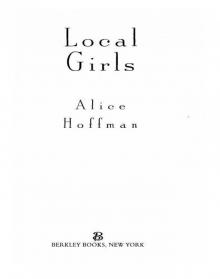 Local Girls
Local Girls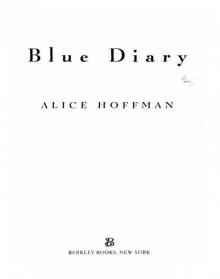 Blue Diary
Blue Diary The River King
The River King Here on Earth
Here on Earth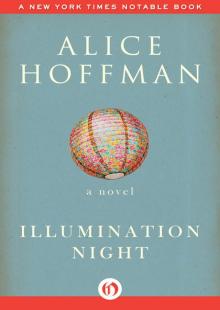 Illumination Night: A Novel
Illumination Night: A Novel The Marriage of Opposites
The Marriage of Opposites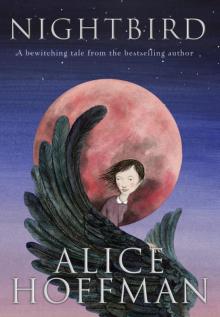 Nightbird
Nightbird Incantation
Incantation Skylight Confessions
Skylight Confessions The Ice Queen
The Ice Queen Second Nature
Second Nature Fortune's Daughter: A Novel
Fortune's Daughter: A Novel Seventh Heaven
Seventh Heaven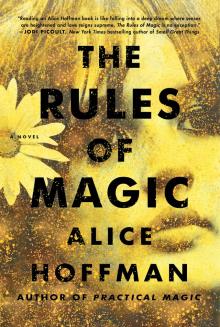 The Rules of Magic
The Rules of Magic The Red Garden
The Red Garden The Third Angel
The Third Angel White Horses
White Horses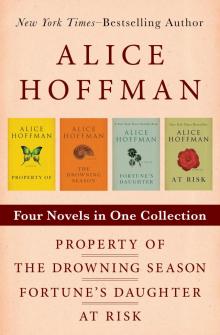 Property of / the Drowning Season / Fortune's Daughter / at Risk
Property of / the Drowning Season / Fortune's Daughter / at Risk Angel Landing
Angel Landing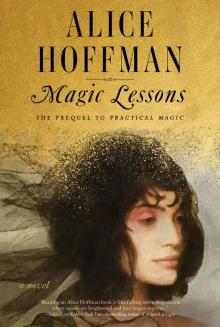 Magic Lessons
Magic Lessons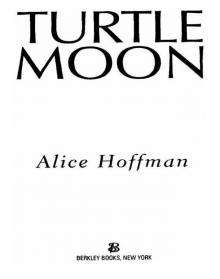 Turtle Moon
Turtle Moon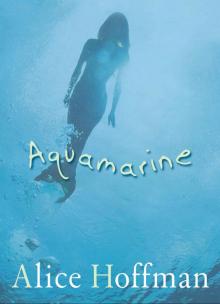 Aquamarine
Aquamarine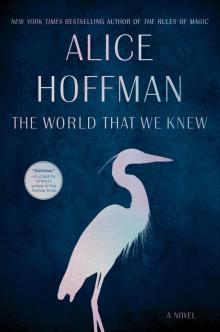 The World That We Knew
The World That We Knew Faithful
Faithful The Dovekeepers
The Dovekeepers The Foretelling
The Foretelling Green Angel
Green Angel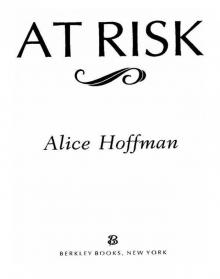 At Risk
At Risk Green Heart
Green Heart Fortune's Daughter
Fortune's Daughter Faerie Knitting
Faerie Knitting Incantation (v5)
Incantation (v5) Green Witch
Green Witch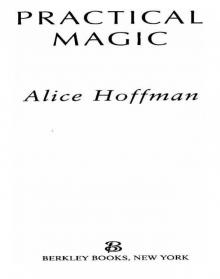 Practical Magic
Practical Magic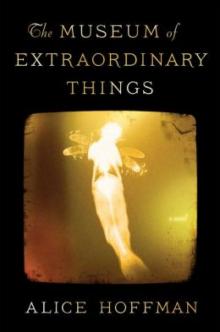 The Museum of Extraordinary Things
The Museum of Extraordinary Things The Probable Future
The Probable Future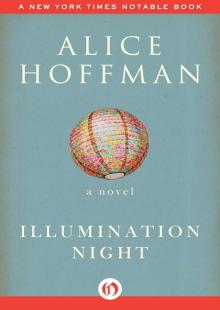 Illumination Night
Illumination Night The Dovekeepers: A Novel
The Dovekeepers: A Novel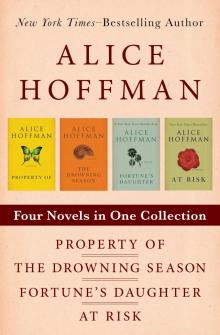 Property Of, the Drowning Season, Fortune's Daughter, and At Risk
Property Of, the Drowning Season, Fortune's Daughter, and At Risk